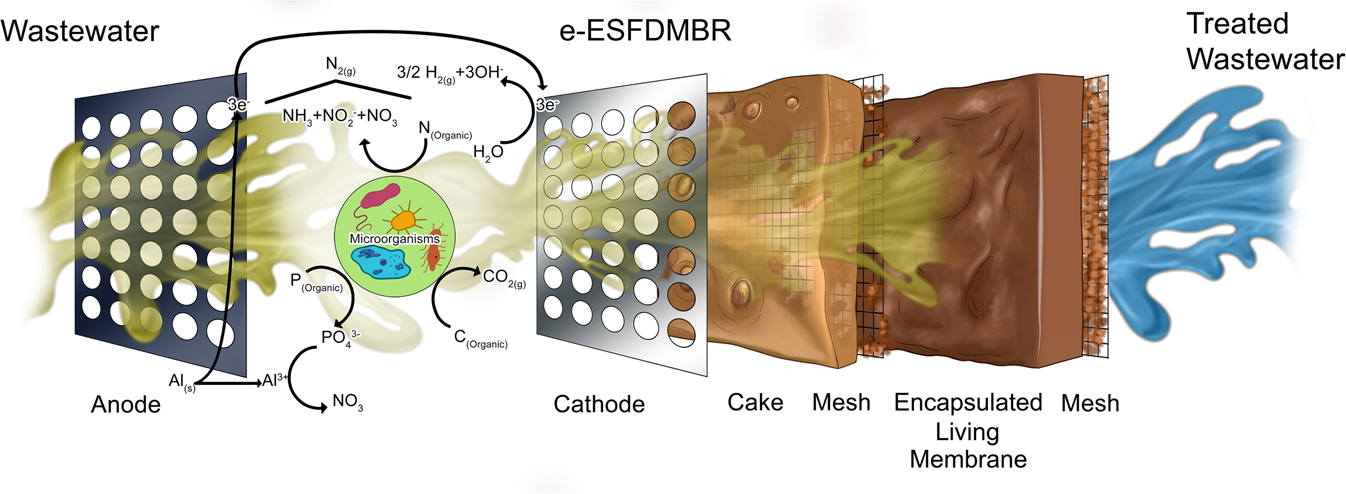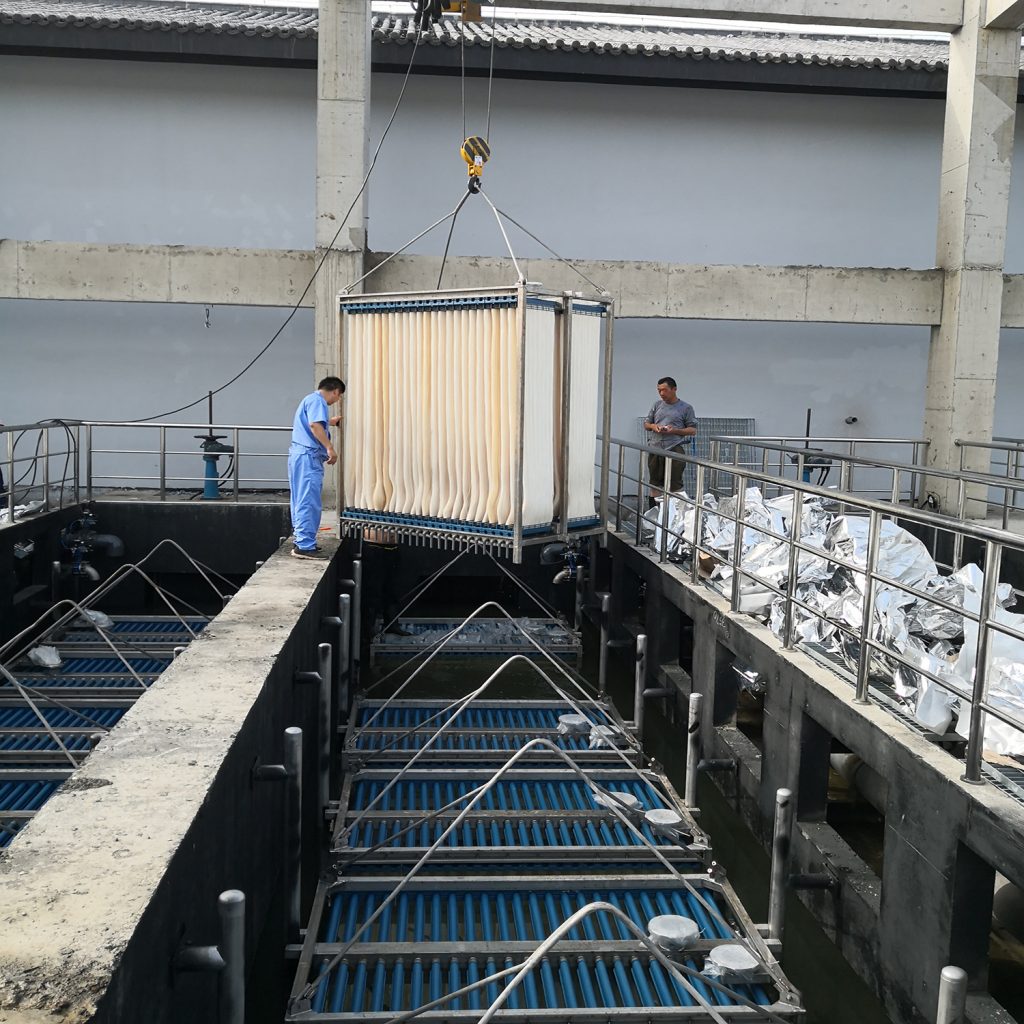How Membrane Bioreactor Contributes to the Reduction of Energy Consumption in Water Treatment
How Membrane Bioreactor Contributes to the Reduction of Energy Consumption in Water Treatment
Blog Article
Recognizing Membrane Layer Bioreactors: The Future of Wastewater Treatment
Membrane layer bioreactors (MBRs) represent a notable innovation in the area of wastewater treatment, integrating biological procedures with innovative membrane purification to enhance effluent top quality. As global water shortage and rigorous regulatory structures become progressively pushing concerns, MBR innovation uses an effective reaction via its ability to lessen impact and maximize resource healing.
What Are Membrane Layer Bioreactors?

The core parts of MBR systems consist of a bioreactor where microbial activity occurs and a membrane system that filterings system the mixed alcohol. This dual performance makes it possible for the synchronised destruction of natural issue and solid-liquid separation in a single step. MBRs can operate in both submerged and external configurations, with submerged systems being much more common due to their compact design and operational efficiency.
The adoption of MBR technology has gained traction in numerous applications, varying from metropolitan wastewater therapy to commercial effluent administration. MBRs are especially helpful in situations where area is stringent or limited effluent top quality criteria need to be satisfied. By preserving a high concentration of microbes within the bioreactor, MBRs boost the destruction of organic pollutants, thereby generating greater treatment efficiencies contrasted to standard techniques.
Trick Benefits of MBR Technology
The assimilation of biological therapy with membrane purification in MBR systems provides numerous benefits that set it besides conventional wastewater therapy methods. Among the primary advantages is the enhanced effluent high quality. MBRs effectively eliminate suspended pathogens and solids, accomplishing greater levels of filtration that meet rigid discharge standards and assist in water reuse applications.

One more substantial advantage is the decreased sludge manufacturing. MBR systems create less excess sludge, causing reduced disposal prices and a decrease in environmental effect. The shut nature of the membrane layer system reduces the danger of smell exhausts and enhances overall process control.
Finally, MBRs are functional and versatile, making them suitable for different wastewater types, consisting of commercial and metropolitan resources. The ability to integrate with advanced treatment innovations additionally improves their performance, making MBRs an encouraging remedy for the future of wastewater management.
Challenges and Limitations of MBRs
While MBR technology offers numerous advantages, it also faces several challenges and limitations that can impact its widespread fostering. One substantial obstacle is the high resources and functional expenses connected with MBR systems. The preliminary investment for membrane products and the essential framework can be significant, making it much less available for smaller sectors or districts.
Furthermore, membrane fouling remains a critical concern that can lessen system efficiency and increase upkeep needs. Fouling happens when solids, organic issue, or bacteria collect on the membrane surface area, bring about minimized permeability and calling for regular cleaning or substitute.
One more limitation entails the intricacy of the innovation. MBR systems require experienced employees for procedure and maintenance, which can be a barrier in areas with minimal technological experience. The disposal of invested membrane layers offers environmental concerns, as the products are frequently not eco-friendly and can contribute to lose management difficulties.
Last But Not Least, while MBRs can efficiently deal with a large range of wastewater, they might not appropriate for all applications, specifically those with high concentrations of fats, oils, and greases, demanding further research and advancement to address these restrictions.
Applications of Membrane Layer Bioreactors
In numerous industries, membrane bioreactors (MBRs) have actually become a versatile service for wastewater therapy (Membrane Bioreactor). Their applications extend municipal, industrial, and farming setups, showcasing their flexibility and effectiveness in diverse atmospheres. In local wastewater therapy plants, MBRs significantly enhance effluent high quality, enabling for water reuse and lowering the ecological influence of discharged wastewater
Industrially, MBRs are employed in food and beverage processing, textile manufacturing, and pharmaceutical production, where they successfully deal with high-strength waste streams. Their ability to take care of rising and fall loads and differing contaminant concentrations makes them particularly valuable in these sectors. Additionally, MBRs facilitate the removal of virus, put on hold solids, and natural issue, adding to compliance with strict discharge policies.
In agriculture, MBRs are increasingly used for dealing with farming drainage and animals wastewater, allowing the recovery of nutrients for fertilizer manufacturing. They additionally help in the treatment of greywater for irrigation, advertising lasting water administration practices.
The versatility of MBRs is further shown by their combination with other technologies, such as anaerobic food digestion and progressed oxidation processes, boosting total performance and resource recuperation in wastewater treatment systems.
The Future of Wastewater Treatment
Innovations in innovation and a growing focus on sustainability are forming the future of wastewater treatment. Membrane layer bioreactors (MBRs) exemplify this shift by incorporating biological therapy processes with membrane purification, leading to top quality effluent ideal for reuse. The pattern towards round economic climates is motivating facilities to adopt MBRs for their capability to recover sources, such as water and nutrients, from wastewater.
Developments in membrane layer materials and arrangement are enhancing the performance and durability of MBR systems, reducing functional costs and energy intake. Smart innovation assimilation, including real-time surveillance and automated control i was reading this systems, is further look what i found enhancing efficiency and allowing anticipating maintenance, therefore decreasing downtime.
Furthermore, societal expectations and governing pressures are pushing markets and districts to adopt more lasting practices. Membrane Bioreactor. The shift in the direction of decentralized wastewater therapy solutions is acquiring grip, permitting localized treatment that minimizes transport costs and energy usage
Verdict
Membrane layer bioreactors (MBRs) represent a transformative method to wastewater therapy, incorporating organic procedures with advanced membrane innovation. The benefits of MBRs, consisting of boosted effluent quality, reduced spatial demands, and lower sludge production, position them as a feasible remedy amid growing urbanization and stricter environmental regulations. In spite of existing difficulties, the continued advancement in membrane layer products and functional approaches assures to bolster the efficacy and adoption of MBRs, ensuring their pivotal role in the future of sustainable wastewater administration.
Membrane bioreactors (MBRs) represent a notable development in the field of wastewater therapy, integrating biological processes with advanced membrane purification to improve effluent top quality.Membrane layer bioreactors (MBRs) integrate biological treatment procedures with membrane layer filtering to efficiently treat wastewater.The integration of organic therapy with membrane filtration in MBR systems offers countless benefits that set it apart from traditional wastewater therapy approaches. click to read Membrane bioreactors (MBRs) exemplify this change by integrating biological therapy processes with membrane purification, resulting in top notch effluent appropriate for reuse.Membrane bioreactors (MBRs) stand for a transformative method to wastewater treatment, incorporating biological procedures with sophisticated membrane modern technology.
Report this page